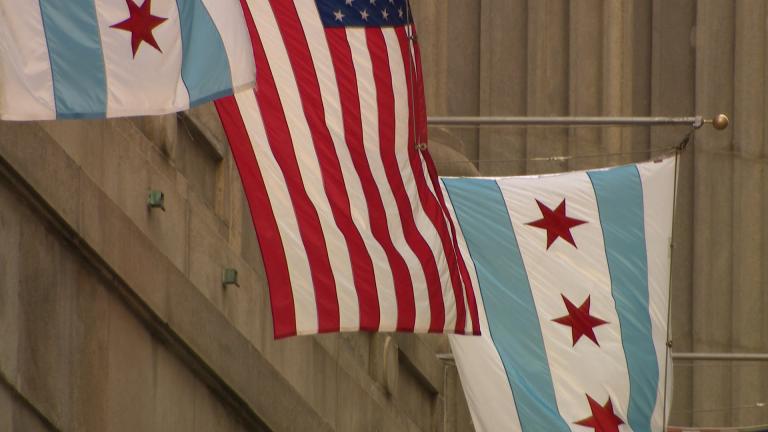 Mayor Lori Lightfoot presides over the city’s first virtual City Council meeting on April 15, 2020. (@chicagosmayor / Twitter)
Mayor Lori Lightfoot presides over the city’s first virtual City Council meeting on April 15, 2020. (@chicagosmayor / Twitter)
Aldermen blocked a measure Wednesday that would have granted Mayor Lori Lightfoot expanded spending and contracting authority to respond to the coronavirus pandemic without the approval of the City Council.
Ald. Carlos Ramirez-Rosa (35th Ward) joined forces with Ald. Raymond Lopez (15th Ward) to delay a vote on the measure that advanced Tuesday on a vote of 23-10 after nearly five hours of debate by the City Council’s Budget Committee.
The effort to delay the vote, technically called a defer and publish, was joined by Alds. Jeanette Taylor (20th Ward), Byron Sigcho-Lopez (25th Ward) and Rossana Rodriguez Sanchez (33rd Ward).
That motion — which only needed the support of two aldermen — automatically sets a vote on the measure for the next City Council meeting.
The move prompted Lightfoot to immediately recess the meeting, and schedule a City Council meeting for 1 p.m. Friday, where aldermen are expected to approve the measure.
Ramirez-Rosa said Lightfoot’s action to schedule another City Council meeting as soon as allowed by state law, which requires 48 hours notice, proves Lightfoot does not need emergency powers.
“This power grab ordinance is unnecessary,” said Ramirez-Rosa, the dean of the Socialist Caucus on the City Council.
Lightfoot lit into the aldermen who blocked the measure, singling out Ramirez-Rosa for the harshest criticism, saying she was “embarrassed” by his actions. Ramirez-Rosa represents the mayor, a Logan Square resident, on the City Council.
Lightfoot said the “small handful” of aldermen chose to “use this moment of crisis to grandstand.”
Lightfoot called the aldermen “selfish” and their actions “shameful.”
The mayor said she welcomed a “robust debate” about the merits of the ordinance, but “dear lord, in the middle of a pandemic, where every day life and death are hanging in the balance — enough with the selfish political stunts.”
Lightfoot said she needed expanded powers to ensure that Chicago can compete in the “global competition” for necessary gear to respond to the pandemic, including personal protective gear and ventilators.
“We don’t have 48 hours to wait,” Lightfoot said. “Some see this as a moment to grandstand. But we don’t have a moment to waste.”
After a confusing parliamentary debate, the City Council ultimately voted 35-15 to approve Lightfoot’s call to meet on Friday.
If approved, the measure would give Chief Procurement Officer Shannon Andrews the authority to approve emergency contracts of up to $1 million to respond to the coronavirus pandemic. In addition, Budget Director Susie Park can spend federal and state relief grants to respond to the pandemic, and move funds within city departments if she deems it necessary.
Park is also required to give the City Council’s Budget Committee weekly summaries of pandemic-related spending and contracts.
In all, the city has spent $5.6 million to respond to the pandemic and has committed to spending another $65 million, officials said. The city expects to spend $150 million by the end of June, according to officials.
If approved, the measure is set to expire June 30, which Lightfoot called “an outside marker” for when the pandemic is expected to peak and begin to recede. If Dr. Allison Arwady, the commissioner of the Chicago Department of Public Health, determines that the pandemic is still raging, the mayor’s emergency powers could be extended.
The version of the ordinance that was set for a final vote Wednesday by the committee was significantly revised after several aldermen objected to it, with many saying it amounted to a mayoral power grab that endangered the City Council’s status as a co-equal branch of government.
Budget Committee Chair Ald. Pat Dowell (3rd Ward) said the measure was not perfect, but struck the “best balance between the moral need to save lives in our communities” while ensuring that taxpayer funds are spent wisely.
Originally, the mayor’s proposal granted Andrews the authority to “enter any contract or amendment to a contract as she deems necessary” without requiring firms to disclose potential conflicts of interest.
The proposal requires economic disclosure forms to be submitted within 60 days. Andrews said she wanted to ensure the requirement for those disclosures did not become a “speed bump” when responding to the pandemic.
The measure also allows Assets, Information and Services Commissioner David Reynolds to enter into rental agreements for space needed to respond to the pandemic. It also allows administrative hearings on city-issued citations to be postponed until the public health emergency passes.
In addition, the measure allows the Plan Commission, the Zoning Board of Appeals and other commissions to meet remotely — and to impose “reasonable limitations on the number or class of speakers.”
Contact Heather Cherone: @HeatherCherone | (773) 569-1863 | [email protected]








